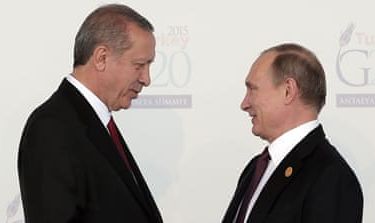Turkey-Russia: The inevitable clash of the titans
The domestic context of this crisis offers political dividends that only deepen division and encourage escalation.

In the aftermath of the Turkish downing of a Russian warplane, the crisis between Turkey and Russia is rapidly escalating. Each country has become hostage to its own political posturing, with both Recep Tayyip Erdogan, the Turkish president, and Vladimir Putin, the Russian president, unable and unwilling to back down and step back.
For both leaders, any concession is seen as an act of weakness. And any compromise seems personally unacceptable and politically untenable. For both men, the imperative is to “save face” and to maintain an image of decisiveness.
Keep reading
list of 4 itemsTurkish opposition wins major cities in local elections
What shapes Turkey’s municipal elections?
Turkey offers to host Russia-Ukraine peace talks as Erdogan hosts Zelenskyy
|
|
| Can Turkey and Russia resolve their dispute? |
This mutual “bluff and bluster” is largely rooted in the similarities of the two presidents. For Erdogan, a personal reliance on impulsive and sometimes rash decisions has long defined his well-crafted image as a strong, unyielding leader. From that perspective, any concession or compromise in this time of crisis would be an unacceptable retreat.
Sharing this trait, Putin is equally hostage to his own political image, as an authoritative leader embracing and exploiting crisis and conflict. And for Putin, especially following his broader confrontation with the West, the stakes are even higher, as he desperately needs to cultivate his personal aura of strength.
Beyond the international ramifications of the crisis between Turkey and Russia, however, it is actually the domestic political context that is the primary driver of discord. For both leaders, the primary audience is domestic.
In Turkey, a well-established trend of increasingly authoritarian rule and an aggressive intolerance for dissent and criticism has forged an unprecedented degree of polarisation. And for Russia, a tendency for authoritarian governance has been even more obvious, with much less of Turkey’s trappings of democracy.
Also read: Predicting Putin’s next move
A combination of populist, personal appeal and authoritarian politics has long served as a foundation for power for each man. For Erdogan’s base of supporters, this has always been a winning formula, while in Putin’s case, this was even more effective, exploiting a deeper Russian dependence on strongmen over statesmen.
Yet, this same source of political strength can become an equally powerful threat, for two reasons. First, this over-reliance on personal strength can be dangerously vulnerable to any false step or miscalculation, where the decisive leader can falter and fail.
|
Each leader has become prisoner of their own rhetoric, which makes it even more difficult for any one side to climb down and step back.
|
A second inherent risk is when popular expectations become dangerously high, and each round of the crisis necessitates even greater force or determination.
This is especially dangerous in this case, as both Erdogan and Putin are facing a new rival – each other. What is new in this case is that both leaders have traditionally bullied, bluffed and bribed their opponents.
Erdogan has been most comfortable with his own aggressive challenge to the United States and Europe, demanding and usually getting what he wants. Putin has also embraced confrontation and conflict, often utilising a “calculated recklessness” in getting his way. This time, however, these similar leaders are face to face, in a clash that for the first time, cannot be won by either.
These two leaders are too alike, and their tactics are too similar for any one side to gain the upper hand. Yet, for these same reasons, each leader has become prisoner of his own rhetoric, which makes it even more difficult for any one side to climb down.
Also read: Could downed warplane contain Russian aggression?
Despite the personal and political similarities of the two presidents, there is one key difference that may suggest that it is the Turkish side that will back down first. The difference stems from the distinct division between the Turkish and Russian cases.
More specifically, Turkey has a much deeper and more durable institutional system. Unlike Putin in Russia, whose institutions are significantly weaker and much more subordinate to the individual president, Erdogan has never been able to fully control or contain the inherent power of Turkish institutions.
Turkey’s court system, business class and even armed forces have never fully succumbed or surrendered. And despite the country’s pronounced polarisation and subjugated media, the institutional legitimacy of Turkey’s institutions remains much more resilient than the populist political appeal of any one individual.
Richard Giragosian is the founding director of the Regional Studies Center, an independent think-tank in Yerevan, Armenia.
The views expressed in this article are the author’s own and do not necessarily reflect Al Jazeera’s editorial policy.
